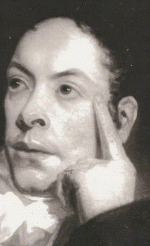The Monk

Author Matthew Lewis, known as "Monk" Lewis, was born on this day in 1775 in London. Lewis is remembered as the author of a notorious gothic novel of the 18th century, The Monk (1795), the story of a depraved monk, Ambrosio, which touched on such shocking topics as rape, incest, matricide, the selling of one's soul to the devil and the Spanish Inquisition.
Lewis spent his childhood in Essex and Paris, attended Christ Church College, Oxford, and began writing plays and romances (somewhat unsuccessfully) as a youth. While on vacation in Europe in 1792, he was moved by a meeting with Goethe. His father, however, tried to push him away from literature into a diplomatic career, getting him assigned to the British embassy at the Hague.
Bored with Dutch society, Lewis began to write again, and inspired by Ann Radcliffe's Mysteries of Udolpho, Lewis began to work on The Monk. It created a sensation almost immediately after being published -- maligned as indecent and immoral by the literary elite while at the same time copied and plundered by lesser writers.
At 21, he returned to England as a member of Parliament for Hindon (ironically, the seat formerly held by gothic romance novelist William Beckford); and when he affixed "M.P." to his name on a second edition of The Monk, Samuel Coleridge and others expressed their outrage that a legislator should sully Parliament by drawing a connection between his salacious novel and his office. He was contrite (he purged the "M.P." from his third edition), but pointed out to his embarrassed father that while he perhaps had too much confidence in his own judgment, "twenty is not the age at which prudence is most to be expected."
Yet he veered away from respectability rather than to it in the ensuing years, writing trash melodramas for the stage (The Castle Spectre, 1797; Alfonso, 1802) which, as William Wordsworth observed, fit the public taste like a glove (although he himself admitted that while "very possibly nobody could write a worse tragedy" than Alfonso, "it is a melancholy truth that I cannot write a better one").
At 27, he had become quite cynical about his talent and celebrity. With his father's death in 1812, Lewis inherited a large fortune, including a West Indian plantation. In 1816, worrying over the condition of the slaves on his father's plantation in Jamaica, he undertook an exhausting, hazardous voyage there to do everything in his power to secure their safety and happiness, keeping a journal of his trip which after his death was published to critical acclaim (as Journal of a West India Proprietor). Returning to England, he found he could not stand to stay, so he passed time trading ghost stories with Byron and Shelley in Italy and returned to Jamaica once more before contracting yellow fever. He died at sea May 14, 1817 of yellow fever, en route from Jamaica back to England.
Critics, Coleridge and Walter Scott among them, expressed their disappointment that a man with such an uncommon gift for verse should have squandered his literary fortunes on tripe. Nevertheless, The Monk stands out as an influential novel to a generation of early 19th century writers, including Poe, Flaubert and Hawthorne.
Labels: Literature





0 Comments:
Post a Comment
Subscribe to Post Comments [Atom]
<< Home